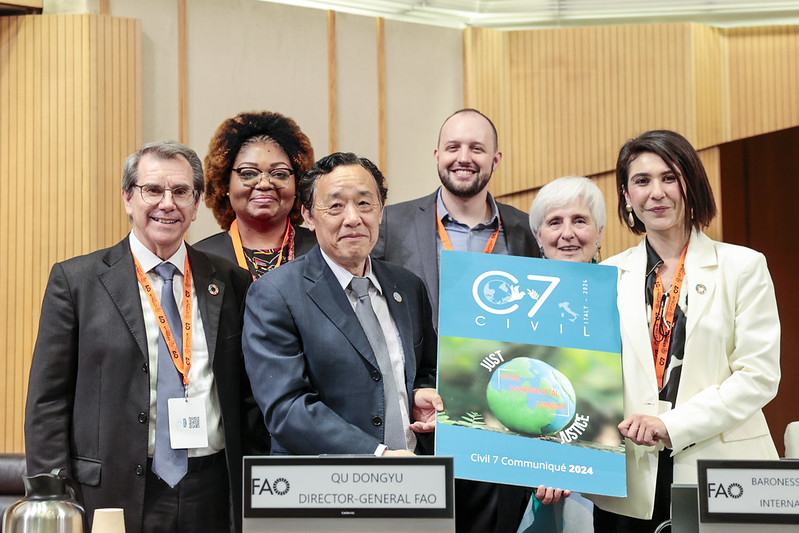Civil7 Summit: Director-General calls for tighter collaboration with civil society to tackle discrimination and inequalities

FAO Director-General QU Dongyu in group photo during C7 Summit Closing Ceremony.
©FAO/Cristiano Minichiello
Rome – Working closely with civil society is critical to support rural people’s rights, promote equality and tackle discrimination, FAO Director-General QU Dongyu said at the Civil7 (C7) International Summit.
The event took place at FAO headquarters in Rome (14-15 May) and was organised and coordinated by the Italian Coalition Against Poverty that chairs the C7 in 2024. Italy is the current president of the G7, and the C7 is one of the official Engagement Groups of the G7 and represents positions from the international Civil Society.
Peace is a prerequisite for food security, and the right to food is a basic human right, the Director-General said urging all actors and partners to develop a more inclusive approach to transform global agrifood systems together with governments, international community, private sector and civil society to make food more available, accessible and affordable for all. To this end, he encouraged to join FAO’s evidence-based, country-led Hand-in Hand initiative to accelerate agricultural transformation, with the goal of eradicating poverty, ending hunger and malnutrition, and reducing inequalities.
“Civil society also plays a very important role in promoting innovations for social inclusion,” the Director-General said.
In his interventions during the event, he cited as an example approaches in Brazil and India. In Brazil, where civil society organizations from the semi-arid region developed an approach for promoting decentralized access to water, with an emphasis on harvesting rainwater. Shortly after, the initiative engaged one million rural families in the construction of cisterns to store rainfed water and to develop capacities for agricultural production in semi-arid conditions. This proposal then became a public programme that reached millions of rural households.
Likewise, in India, civil society developed the approach of Self-Help Groups, mobilizing poor rural households into savings and credit associations, which was scaled up nationally through the creation of a public policy to support this initiative.
The C7 engages with the G7 on key issues such as promoting social and economic development and well-being for all, ensuring access to healthy diets, gender equality, and protecting the environment, among others. These priorities support FAO’s mandate, Qu noted.
The Director-General reiterated FAO’s commitment to continue working closely with civil society in an efficient, effective, and coherent manner to achieve the Four Betters: better production, better nutrition, a better environment and a better life – leaving no one behind.
Other participants included Cardinal Matteo Maria Zuppi, President, Italian Episcopal Conference (via video call); Lisa Clark, Vice-President, Beati i costruttori di pace - Italian Peace and Disarmament Network; Sean Conner, Executive Director, International Peace Bureau; Baroness Dayon Ako-Adounvo, Council member, International Peace Bureau and IPB African Network; Riccardo Moro, C7 Chair. A special message to the C7 was read on behalf of Antonio Tajani, Italian Minister of Foreign Affairs and International Cooperation.
